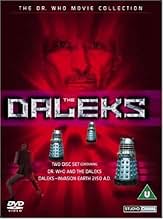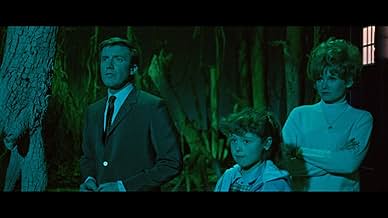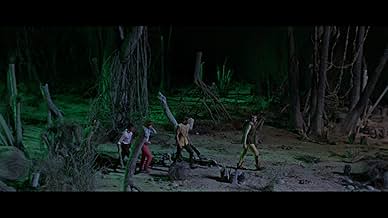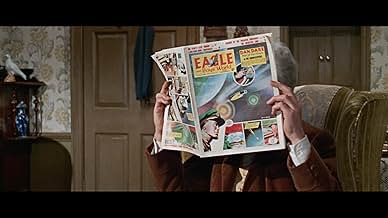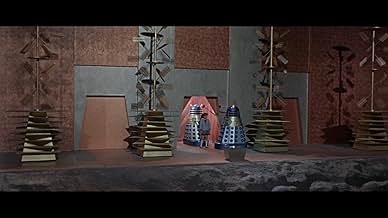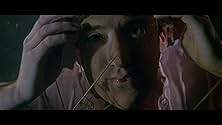CALIFICACIÓN DE IMDb
5.6/10
5.6 k
TU CALIFICACIÓN
Un excéntrico inventor y sus compañeros viajan en su TARDIS al planeta Skaro y luchan contra la malvada amenaza de los Daleks.Un excéntrico inventor y sus compañeros viajan en su TARDIS al planeta Skaro y luchan contra la malvada amenaza de los Daleks.Un excéntrico inventor y sus compañeros viajan en su TARDIS al planeta Skaro y luchan contra la malvada amenaza de los Daleks.
- Dirección
- Guionistas
- Elenco
Nicholas Head
- Thal
- (as Nicolas Head)
Mike Lennox
- Thal
- (as Michael Lennox)
Opiniones destacadas
If, like me, you enjoy checking out the reviews *before* seeing the film, here's the premise in a nutshell: A mishap with silver-haired scientist Doctor Who's latest invention hurls the cast through space and time, landing them in the midst of an eerie alien wasteland. The Doctor's companions on this unanticipated adventure are his granddaughters Susan and Barbara, and Barbara's boyfriend Ian. Needing parts to repair their damaged time machine, the company seeks help in a nearby city, only to be captured and imprisoned by the ruthless mechanical Daleks, a race of machine-bound mutants bent on world domination.
To followers of the original TV series, this plot will be as familiar as the Daleks' squawking cries of 'Exterminate,' and despite some changes to the cast (most notably the Doctor being portrayed as a human), it faithfully captures the spirit of the early programs. For viewers who've never experienced the original Who, or who don't have a taste for early pulp-style adventure sci-fi, this movie will probably be less appealing. It's a fan flick pure and simple, expressly designed to capitalize on the wave of Dalekmania that swept Britain in the mid-1960s following the show's BBC premiere.
Ironically, the film's weakest link is the Daleks themselves. The writers and producers were no doubt keen to capitalize on the popularity of the metal meanies, but it has to be said that the Daleks really don't have much of a screen presence. With their absolute lack of expression, clumsy movement, and painfully slow, mechanical, grating voices, they should never have been scripted to carry any scenes by themselves; however (alas) there are more than a few passages in the film that consist of nothing more than Dalek cross-talk acts, with one metal peppergrinder haltingly rasping its lines to another. Still, I'm one who's been spoiled by the routinely mind-blowing special effects of the 21st century; to Britons of the '60s, the stuff I find boring might have seemed menacing.
Daleks aside, the most memorable aspect of the film is the eye-popping color. The filmmakers pulled out all the stops to give the sets a wonderfully vibrant feel, liberally filling every scene with multi-hued Daleks, glowing control panels, or eerily-lit alien landscapes. This film was the first opportunity for fans to see Doctor Who in color (sorry, `colour'), and they certainly got it in spades. (The original TV series didn't drop the black-and-white format until 1970, five years later.)
The film's greatest strength is its casting, with the best performance by far coming from veteran actor Peter Cushing, best known to U.S. audiences as Grand Moff Tarkin in Star Wars. Cushing's delivery is predictably brilliant, and helps bring conviction and flair to a script that might otherwise come off as unbearably campy. As the Doctor he's also just plain likeable - much more so in fact than his TV counterpart (played by William Hartnell) who often came off as crusty and gruff. Roberta Tovey as the young Susan also gives a marvelous performance, something that's a true rarity among kid actors. Jennie Linden does an adequate job as Barbara, though her character has no clear role in the story and was probably just included to suggest continuity with the TV series, while Roy Castle provides some (generally successful) comic relief with his portrayal of the bumbling klutz Ian. Kudos also to Barrie Ingham (Thal leader Alydon) for actually giving a credible performance from beneath false eyelashes and a blonde wig.
The bottom line? The film's a little too far removed from modern tastes to be enjoyed by the average Joe, but to Who fans and sci-fi aficionados it'll be a delight.
To followers of the original TV series, this plot will be as familiar as the Daleks' squawking cries of 'Exterminate,' and despite some changes to the cast (most notably the Doctor being portrayed as a human), it faithfully captures the spirit of the early programs. For viewers who've never experienced the original Who, or who don't have a taste for early pulp-style adventure sci-fi, this movie will probably be less appealing. It's a fan flick pure and simple, expressly designed to capitalize on the wave of Dalekmania that swept Britain in the mid-1960s following the show's BBC premiere.
Ironically, the film's weakest link is the Daleks themselves. The writers and producers were no doubt keen to capitalize on the popularity of the metal meanies, but it has to be said that the Daleks really don't have much of a screen presence. With their absolute lack of expression, clumsy movement, and painfully slow, mechanical, grating voices, they should never have been scripted to carry any scenes by themselves; however (alas) there are more than a few passages in the film that consist of nothing more than Dalek cross-talk acts, with one metal peppergrinder haltingly rasping its lines to another. Still, I'm one who's been spoiled by the routinely mind-blowing special effects of the 21st century; to Britons of the '60s, the stuff I find boring might have seemed menacing.
Daleks aside, the most memorable aspect of the film is the eye-popping color. The filmmakers pulled out all the stops to give the sets a wonderfully vibrant feel, liberally filling every scene with multi-hued Daleks, glowing control panels, or eerily-lit alien landscapes. This film was the first opportunity for fans to see Doctor Who in color (sorry, `colour'), and they certainly got it in spades. (The original TV series didn't drop the black-and-white format until 1970, five years later.)
The film's greatest strength is its casting, with the best performance by far coming from veteran actor Peter Cushing, best known to U.S. audiences as Grand Moff Tarkin in Star Wars. Cushing's delivery is predictably brilliant, and helps bring conviction and flair to a script that might otherwise come off as unbearably campy. As the Doctor he's also just plain likeable - much more so in fact than his TV counterpart (played by William Hartnell) who often came off as crusty and gruff. Roberta Tovey as the young Susan also gives a marvelous performance, something that's a true rarity among kid actors. Jennie Linden does an adequate job as Barbara, though her character has no clear role in the story and was probably just included to suggest continuity with the TV series, while Roy Castle provides some (generally successful) comic relief with his portrayal of the bumbling klutz Ian. Kudos also to Barrie Ingham (Thal leader Alydon) for actually giving a credible performance from beneath false eyelashes and a blonde wig.
The bottom line? The film's a little too far removed from modern tastes to be enjoyed by the average Joe, but to Who fans and sci-fi aficionados it'll be a delight.
The first time I saw Dr Who and the Daleks, I used to cower behind the sofa every time the Daleks appeared, and the music I remembered was incredibly haunting. Seeing it again, it isn't quite as good as I remembered, but it is an entertaining and passable enough piece of nostalgia. The script lacks bite at times, the plot isn't as inventive as any of the ones used in the landmark TV series, Roy Castle and the comedy relief felt out of place and on occasions because of the overuse of pink plastic sheeting the art direction was a little on the cheap side. However, the music is very haunting, the Daleks are still as intimidating as I remembered, the pacing is fast and fun, the length is amiable and Peter Cushing is terrific as the Doctor, more serious than any of the other doctors but it suits him. The female characters are admittedly on the vapid side, but the alluring personalities of Roberta Tovey and Jennie Linden made up for it. Overall, fun and nostalgic, even with its many faults. 6/10 Bethany Cox
When Dr. Who (Peter Cushing) shows his time machine TARDIS to the clumsy Ian (Roy Castle), who is boyfriend of his granddaughter Barbara (Jennie Linden), he accidentally transport them and Dr. Who´s granddaughter Susan (Roberta Tovey) to somewhere in space and time. They explore the spot and see a city; Dr. Who fakes a leak in the fluid and they go to the city to seek mercury to refill the component. They are captured by the Daleks and soon they learn that a war between Daleks and Thals has destroyed the planet. Further they are exposed to radiation and only the Thals have the antidote. The Daleks send Susan to find the cure and she meets the Thal Alydon (Barrie Ingham) that has the antidote and wants to negotiate with the Daleks to exchange for food. But the cruel Daleks want to destroy the Thals to rule the world.
The naïve "Dr. Who and the Daleks" is a funny entertainment for children and for adults in a Saturday afternoon. The art direction is very poor, the plot is silly but in the 60´s we had "National Kid", "Lost in Space" among other films and "Dr. Who and the Daleks" is in the same level. My vote is six.
Title (Brazil): "Dr. Who e a Guerra dos Daleks" ("Dr. Who and the War of the Daleks")
The naïve "Dr. Who and the Daleks" is a funny entertainment for children and for adults in a Saturday afternoon. The art direction is very poor, the plot is silly but in the 60´s we had "National Kid", "Lost in Space" among other films and "Dr. Who and the Daleks" is in the same level. My vote is six.
Title (Brazil): "Dr. Who e a Guerra dos Daleks" ("Dr. Who and the War of the Daleks")
A fun adventure film that, while it may be too dated for today's youngsters, still has a certain sparkle that is perfect fare for a rainy Saturday.
While fans of the BBC series "Doctor Who" (1963), upon which the film is based, may be distracted by the film's use of creative licence (the characterizations are very different from those of their television counterparts,) if not taken too seriously, this is a quite enjoyable trek across an alien landscape and a classic battle of good vs. evil.
The character of Ian is played comically by Roy Castle though he is heroic where the situation demands. Jennie Linden's Barbara is a bit different from other females of the genre as she holds her own when things get tough, rarely dissolving into screams. Roberta Tovey is delightful as Susan, and kids will love her. Peter Cushing really shines, wisely not trying too hard to emulate his television counterpart William Hartnell, and makes the character his own.
All-in-all, an exciting romp.
While fans of the BBC series "Doctor Who" (1963), upon which the film is based, may be distracted by the film's use of creative licence (the characterizations are very different from those of their television counterparts,) if not taken too seriously, this is a quite enjoyable trek across an alien landscape and a classic battle of good vs. evil.
The character of Ian is played comically by Roy Castle though he is heroic where the situation demands. Jennie Linden's Barbara is a bit different from other females of the genre as she holds her own when things get tough, rarely dissolving into screams. Roberta Tovey is delightful as Susan, and kids will love her. Peter Cushing really shines, wisely not trying too hard to emulate his television counterpart William Hartnell, and makes the character his own.
All-in-all, an exciting romp.
An elderly scientist named Doctor Who invents a machine that can travel through time and space called the TARDIS. He lives with his two granddaughters, Barbara and Susan. Barbara has a bumbling boyfriend named Ian who accidentally turns the TARDIS on and transports the four of them to an alien planet inhabited by the peaceful Thals and the destructive Daleks. Doctor Who tries to convince the Thals to reclaim their planet before the Daleks detonate a neutron bomb.
First things first, we have to put aside comparisons to the TV Doctor Who. There's very little that's similar between the two, even though this movie is based off of one of the earliest stories from the show. The Doctor is human not an alien time lord and his name is literally Doctor Who here, not The Doctor. Judging this by its own merits, I thought it was watchable and sometimes even good. Peter Cushing is enjoyable, as are Jennie Linden and Robert Tovey as his granddaughters. Linden looks quite good in her pink capris. I wasn't crazy about Roy Castle, particularly when he's trying to be funny. It's filmed in a lovely Technicolor, which I always appreciate. The effects and sets may appear cheesy to some today but I think they're very creative and fun, as sci-fi designs usually were back in the day. The music's pretty good, too. This isn't likely to appeal to many modern Who fans but I think people who like Peter Cushing and Amicus will find something to enjoy about this.
First things first, we have to put aside comparisons to the TV Doctor Who. There's very little that's similar between the two, even though this movie is based off of one of the earliest stories from the show. The Doctor is human not an alien time lord and his name is literally Doctor Who here, not The Doctor. Judging this by its own merits, I thought it was watchable and sometimes even good. Peter Cushing is enjoyable, as are Jennie Linden and Robert Tovey as his granddaughters. Linden looks quite good in her pink capris. I wasn't crazy about Roy Castle, particularly when he's trying to be funny. It's filmed in a lovely Technicolor, which I always appreciate. The effects and sets may appear cheesy to some today but I think they're very creative and fun, as sci-fi designs usually were back in the day. The music's pretty good, too. This isn't likely to appeal to many modern Who fans but I think people who like Peter Cushing and Amicus will find something to enjoy about this.
¿Sabías que…?
- TriviaAs an incentive Roberta Tovey (who was 11 at the time the film was produced) was paid a shilling (5p) by director Gordon Flemyng every time she did a scene in one take. She made so much money, Flemyng didn't offer her the same deal for the sequel. For the modern day comparison, a shilling from 1965 had the buying power of £1 now, or about $1.30.
- ErroresUnless the TARDIS crew has shrunk at the close of the film, the stock Roman Legion footage is out-of-scale with the on-set actors.
- Créditos curiososRobert Jewell is wrongly credited as Robert Jewel.
- ConexionesEdited into Dr. Who and the Daleks (2013)
Selecciones populares
Inicia sesión para calificar y agrega a la lista de videos para obtener recomendaciones personalizadas
- How long is Dr. Who and the Daleks?Con tecnología de Alexa
Detalles
- Fecha de lanzamiento
- País de origen
- Idioma
- También se conoce como
- Dr. Who y los Daleks
- Locaciones de filmación
- A Stage, Shepperton Studios, Shepperton, Surrey, Inglaterra, Reino Unido(Dalek City interiors)
- Productoras
- Ver más créditos de la compañía en IMDbPro
Taquilla
- Presupuesto
- GBP 180,000 (estimado)
- Total a nivel mundial
- USD 114,062
- Tiempo de ejecución1 hora 22 minutos
- Color
- Relación de aspecto
- 2.35 : 1
Contribuir a esta página
Sugiere una edición o agrega el contenido que falta

Principales brechas de datos
What is the French language plot outline for Dr. Who and the Daleks (1965)?
Responda


